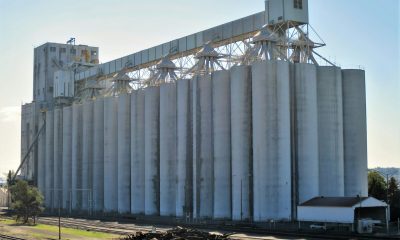Business
8 major supply chain technology trends of 2019
There are various technologies that have an effect on supply chains. Have you experienced using some of these useful tech at home or at work?

For businesses in every sector, effective supply chain management is essential to success. This is true for businesses involved in the production of consumer goods, those that sell them, and everyone in-between. That’s because making sure that everything from raw materials to finished goods gets to and from where they need to travel on time and on a budget is integral to running an efficient and profitable enterprise.
In recent years, there’s been plenty of refinements to the underlying theory of modern supply chain management, which is helping businesses to do more with less and operate just-in-time supply chains on a global scale. Those refinements, however, pale in comparison to the ways that advancing technology is promising to revolutionize everything about modern supply chains going forward.
To illustrate how many different types of technologies are having a profound effect on supply chains everywhere, industry analysts at Gartner have prepared a report detailing the eight major supply chain technology trends of 2019. Here’s what they are.
Artificial intelligence
At their core, all supply chains involve hundreds or thousands of interactions and decision points that have the potential to slow down throughput up and down the chain. That’s why automation is expected to play such an important role in the supply chains of the future. To make that a reality, a whole new range of artificial intelligence (AI) platforms are being brought to bear on tasks ranging from determining optimal delivery routes to providing early warnings of equipment failure in the warehouse and last-mile operations. The latest systems aim to avert slowdowns and remove the lead-times associated with human analysis and decision making at every point of the supply chain process.
Internet of things
As the latest in 5G wireless networks start to come online, they’re going to enable supply chains to have unprecedented visibility into every phase of their operations by allowing far greater use of Internet of Things (IoT) technology. That means that devices involved in every aspect of operations will be connected to the internet and capable of delivering real-time data and diagnostic information to managers. That’s going to increase uptime, efficiency, and supply chain reliability in ways that today’s businesses can’t even fathom yet.
Data analytics
One of the benefits of all of the IoT technology that’s entering supply chain systems is the wealth of data that they provide to supply chain managers. Data, though, is useless if no actionable insight is gained from it. That’s why advanced data analytics are going to be an indispensable part of supply chains going forward, to assist with strategic planning, resource deployment, and asset management. Data analysis will identify new opportunities for efficiency and time savings, making tomorrow’s supply chains more agile and responsive to even momentary trends.
Robotic process automation
If there’s one thing that all supply chains have in common, it’s that they involve plenty of repetitive tasks and those tasks leave room for efficiency-sapping errors. Robotic process automation (RPA) promises to automate many of those repetitive tasks, taking on responsibility for invoice and purchase order creation, inventory management, and responses to RFPs. Also, RPA will generate even more data to feed data analytics operations, creating a constructive feedback loop to further enhance efficiency.

A new range of artificial intelligence platforms is being used for tasks such as delivery and providing early warnings signs of equipment failure. (Photo by DepositPhotos)
Autonomous things
In everyday operations, supply chains depend on movement – within warehouses, between cities, and around the world. Today, all of that movement requires drivers, pilots, and delivery people. Now, however, the advent of autonomous vehicles is changing everything about how supply chains handle movement, from autonomous warehouse robots to self-driving trucks and last-mile delivery systems. As technology improves, supply chains will adopt more autonomous things into their operations, cutting costs and improving efficiencies.
Immersive experiences
As virtual reality (VR) and augmented reality (AR) systems advance, they’re going to be put to work within supply chains in a variety of roles. AR, for example, can help facility managers see equipment footprints in real-time, which will streamline procurement and systems integration. VR could be used to help simulate large-scale operational changes before they’re implemented in the real world, making it possible to game out new possibilities without disrupting current operations. Together, these types of immersive experiences will save time and unleash all-new options for decision makers and workers at every point of a supply chain.
Digital supply chain twin
As supply chains grow ever-larger and more complex, they’re getting harder for managers to maintain control over, let alone visualize and operate. One of the major problems with that is the fact that massive supply chain systems defy attempts at operational changes and enhancements because they’re difficult to fully analyze. A digital supply chain twin, though, solves those problems. It’s like a computerized living map of an end-to-end supply chain operation. It can be used to model operational changes or develop new procedures, all while accounting for the interconnections inherent in global supply networks. In short, they make massive operations manageable and increase transparency into operations.
Blockchain
Last, but not least, blockchain systems are continuing their steady march into supply chains of all kinds. The distributed digital ledger system is already powering a real-time produce tracking system for retail giant Walmart, which allows for instant traceability of the produce products on their shelves. With it, Walmart can now instantly identify the source of a particular item, which is vital when there’s a food safety recall or the potential of contamination.
They’re not alone, either. Shipping giant Maersk is using blockchain to reduce friction in global shipping operations, FedEx is pushing for a standardized global blockchain system for secure international shipping, and even diamond conglomerate de Beers is using blockchain to help authenticate and track diamonds all across their global supply chain. No matter where you look, blockchain is turning up in supply chains of all kinds, and it’s only the beginning.
The bottom line
Taken together, all of these advancing technologies promise to revolutionize supply chains around the world, and in some ways, already have. As they continue to mature and grow into new products and solutions, it’s easy to imagine a day when global supply chain systems operate with near-perfect reliability and efficiency, with little to no human input at all. When that happens, it will set off a renaissance of sorts; allowing businesses of all kinds to thrive and enabling whole new types of commerce we can’t yet imagine. It’ll be a brave new world, and we’ll have these supply chain technologies to thank – and it’ll be here sooner than you think.
(Featured image by DepositPhotos)
—
DISCLAIMER: This article expresses my own ideas and opinions. Any information I have shared are from sources that I believe to be reliable and accurate. I did not receive any financial compensation for writing this post, nor do I own any shares in any company I’ve mentioned. I encourage any reader to do their own diligent research first before making any investment decisions.

-

 Business2 weeks ago
Business2 weeks agoTopRanked.io Weekly Affiliate Digest: What’s Hot in Affiliate Marketing [Best Technology Affiliate Programs]
-

 Business7 days ago
Business7 days ago2.5 Billion People Watch Quiz Shows Every Day. Masters of Trivia (MOT) Is Letting Them Compete
-

 Crypto2 weeks ago
Crypto2 weeks agoBitcoin Steady Near $68K as ETF Outflows and Institutional Moves Shape Crypto Markets
-

 Crypto2 days ago
Crypto2 days agoMiddle East Tensions Shake Crypto as Bitcoin and Ethereum Slip

























